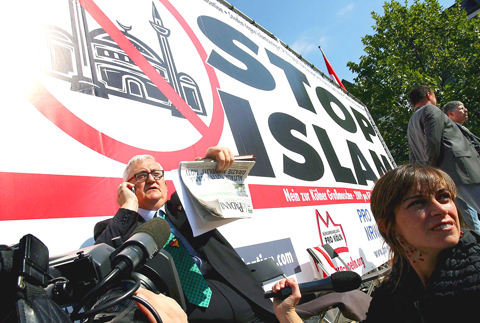German police said tens of thousands of Cologne residents took to the streets on Saturday in protest at an “anti-Islamization” conference of European far-right leaders.
Carrying banners saying: “We are Cologne — Get rid of the Nazis,” protesters gathered outside the city’s cathedral to demonstrate against the congress organized by the local far-right group Pro-Koeln, or “For Cologne.”
Pro-Koeln began two days of seminars on Friday during which speakers denounced an influx of Muslims to Germany and the construction of one of Europe’s largest mosques in the city.

PHOTO: EPA
RALLY BAN
Earlier on Saturday, police banned a rally organized by far-rightists in Cologne just as it was about to begin, following clashes with thousands of opponents.
Some 3,000 police, drafted in to control the protests and seal off part of the old city, used truncheons and water hoses to fend off violent “anti-fascist” leftist activists.
“It is a dictatorship!” said a Pro-Koeln member of the decision to ban the far-right rally.
Andreas Molzer, a member of the European Parliament and an Austrian far-right group who attended the congress, called the ban an “anti-democratic scandal.”
Pro-Koeln had hoped 1,500 people would attend Saturday’s rally in the city center to oppose the mosque and an “immigrant invasion” of Europe.
Those attending the congress, including far-right leaders from Belgium, Austria and Italy, protested against “Islamification” and voiced support for Europe’s “Western values and Christian traditions.”
BLOCKADE
The counter-protest, called by trade unions, churches and anti-racist movements, saw thousands of students, families and local businessmen and women carry signs with slogans including “No to Racism” and “Cologne is rebelling!”
They disrupted the Pro-Koeln congress, ensuring less than 50 delegates were able to return to the meeting on Saturday morning.
Cologne Mayor Fritz Schramma, whose city council gave the green light for the construction of the huge mosque, slammed Pro-Koeln as “arsonists and racists” hiding under the cloak of a “citizens’ movement” in a speech earlier on Saturday.
NO BEER FOR FAR RIGHT
Meanwhile, around 150 bars in Cologne stopped selling Pro-Koeln members the local Kolsch beer with some taxi and bus drivers also refusing to transport delegates to the congress.
One hotel even canceled bookings made by “undesirables.”
On Friday, several hundred opponents of the congress formed a human chain around a mosque in solidarity with the Muslim minority, which numbers more than 3 million in Germany, or 4 percent of the population.
Pro-Koeln has five elected local councilors and is chasing other official positions in the region.

POLITICAL PATRIARCHS: Recent clashes between Thailand and Cambodia are driven by an escalating feud between rival political families, analysts say The dispute over Thailand and Cambodia’s contested border, which dates back more than a century to disagreements over colonial-era maps, has broken into conflict before. However, the most recent clashes, which erupted on Thursday, have been fueled by another factor: a bitter feud between two powerful political patriarchs. Cambodian Senate President and former prime minister Hun Sen, 72, and former Thai prime minister Thaksin Shinawatra, 76, were once such close friends that they reportedly called one another brothers. Hun Sen has, over the years, supported Thaksin’s family during their long-running power struggle with Thailand’s military. Thaksin and his sister Yingluck stayed

In the sweltering streets of Jakarta, buskers carry towering, hollow puppets and pass around a bucket for donations. Now, they fear becoming outlaws. City authorities said they would crack down on use of the sacred ondel-ondel puppets, which can stand as tall as a truck, and they are drafting legislation to remove what they view as a street nuisance. Performances featuring the puppets — originally used by Jakarta’s Betawi people to ward off evil spirits — would be allowed only at set events. The ban could leave many ondel-ondel buskers in Jakarta jobless. “I am confused and anxious. I fear getting raided or even

Kemal Ozdemir looked up at the bare peaks of Mount Cilo in Turkey’s Kurdish majority southeast. “There were glaciers 10 years ago,” he recalled under a cloudless sky. A mountain guide for 15 years, Ozdemir then turned toward the torrent carrying dozens of blocks of ice below a slope covered with grass and rocks — a sign of glacier loss being exacerbated by global warming. “You can see that there are quite a few pieces of glacier in the water right now ... the reason why the waterfalls flow lushly actually shows us how fast the ice is melting,” he said.

Residents across Japan’s Pacific coast yesterday rushed to higher ground as tsunami warnings following a massive earthquake off Russia’s far east resurfaced painful memories and lessons from the devastating 2011 earthquake and nuclear disaster. Television banners flashed “TSUNAMI! EVACUATE!” and similar warnings as most broadcasters cut regular programming to issue warnings and evacuation orders, as tsunami waves approached Japan’s shores. “Do not be glued to the screen. Evacuate now,” a news presenter at public broadcaster NHK shouted. The warnings resurfaced memories of the March 11, 2011, earthquake, when more than 15,000 people died after a magnitude 9 tremor triggered a massive tsunami that